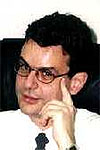The first teaches us how seamless the transformation from democracy to military dictatorship appears - when it is gradual and, ostensibly, reactive (responding to external shocks and events). The second illustrates the risks inherent in relying on mercenaries and insurgents as tools of foreign and military policy.
Arnold Toynbee, the distinguished historian correctly observed that the last days of empires are characterized by grandiose construction schemes, faraway conquests and a materialistic spree of conspicuous consumption. Is the United States about to disintegrate?
The notion sounds preposterous. Hale, affluent, mighty, victorious and assured - the USA appears to be beyond destruction. But so did the U.S.S.R. in 1981. As history accelerates, processes which used to unfold over centuries, now consume mere decades. Telecommunications, global transports and information networks, such as the Internet - pit the likes of the USA against the ultimate superpowers: world opinion and global capital.
The disintegration of empires is rarely the outcome of merely one or more external shocks. For these to have their deleterious effects, the edifice must be already rotten, the pillars crumbling, the consensus gone, the ethos disputed and adversity rampant. As internal tensions mount and the centrifugal outweighs the centripetal - democracy is surreptitiously and incrementally eroded and replaced by an authoritarian form of government.
In his tome, "The Future of Freedom", Fareed Zakaria bemoans the existence of "illiberal democracy" - with all the trappings of one but without its constitutional substance and philosophical foundations. The United States is: ''increasingly embracing a simple-minded populism that values popularity and openness as the key measures of legitimacy... The result is a deep imbalance in the American system, more democracy but less liberty.''
Herodotus (Histories, Book III) would have concurred:
''In a democracy, malpractices are bound to occur ... corrupt dealings in government services lead ... to close personal associations, the men responsible for them putting their heads together and mutually supporting one another. And so it goes on, until somebody or other comes forward as the people's champion and breaks up the cliques which are out for their own interests. This wins him the admiration of the mob, and as a result he soon finds himself entrusted with absolute power.''
As would Jose Ortega y Gasset (The Revolt of the Masses, 1932):
"A characteristic of our times is the predominance, even in groups traditionally selective, of the mass and the vulgar. Thus, in intellectual life, which of its essence requires and presupposes qualification, one can note the progressive triumph of the pseudo-intellectual, unqualified, unqualifiable..."
The columnist Chris Deliso notes in Antiwar.com that "since September 11th especially, the country has suffered draconian restrictions on civil liberties and the rapid erosion of judicial and governmental transparency. At the same time, the increasing expenditure of taxpayer dollars has been conducted at variance with traditional ideals of free market competition and avoidance of embedded government cronyism. Now, with the invasion of Iraq, the nadir has been reached: long-suppressed desires for empire have come out into the open."
Deliso ascribes these worrisome trends to "three toxic substances. The first is relentless paranoia of the outside world. According to this, all kinds of civilian restrictions and pre-emptive foreign wars become justified for the sake of 'national security'. Second is the all-pervasive cronyism between government oligarchs and corporations, which retard the practice of a free market economy. Finally, there is a belief in the ineluctable nature of 'progress', i.e., a teleological narrative that describes America's political system as supreme, and destined to supercede and convert those of all other nations."
As others have noted, America's transition from republic to empire is remarkably reminiscent of Rome's. The irony is that as the United States inevitably becomes less democratic - it will also become less elitist. The mediocre and inapt peripatetic representatives of the popular will be replaced not by disinterested technocrats and expert civil servants but by usurpers, power brokers, interest groups, and criminal-politicians.
The Founding Fathers looked to Rome as a model. It is often forgotten that Rome has been a republic (509-27 BC) for as long as it has been an empire (27 BC - 476 AD). Hence the Senate, the bicameral legislature, the institutions of jury and professional judges, the interlocking system of checks and balances and other fixtures of American life.
Rome, like the USA, was a multicultural, multiethnic and inclusive melting pot. The family and religion - the mainstays of the American value system - were also the pivots of Roman society. Their work ethic was "Protestant" and their conduct "Calvinistic": frugality, self-reliance, steadfastness, seriousness, "fides" (good faith and reliability) were considered virtues.
From 287 BC, Rome was a full-fledged democracy and meritocracy - one's acquired wealth rather than one's arbitrary birth determined one's place in life.
(Note: You can view every article as one long page if you sign up as an Advocate Member, or higher).




